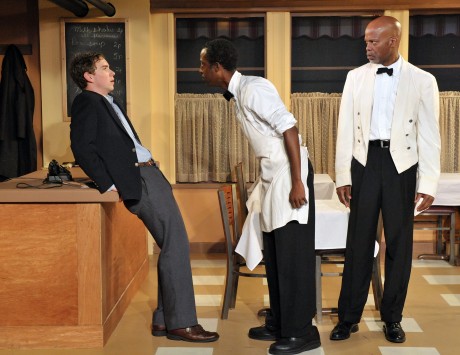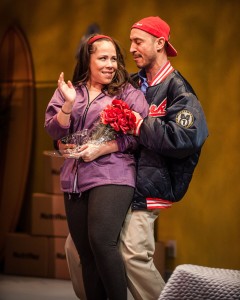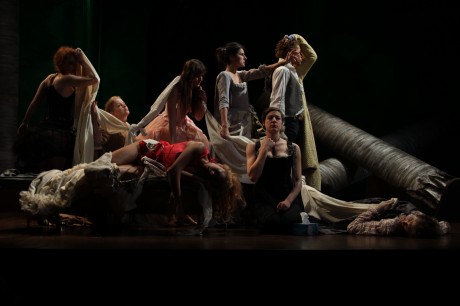|
JACQUELINE LAWTON: Why did you decide to get into theatre? Was there someone or a particular show that inspired you?
SYDNEY-CHANELE DAWKINS: The performing arts have always been a part of my life and I thank God and my parents for raising me with a full embrace and appreciation of the arts as a desired and consistent component of my education and upbringing. Freedom of expression is a gift, and that what writing is for me. I thoroughly enjoying writing theater and film criticism, I take it seriously, and I am always look for ways to improve. The film criticism of Manny Farber, Pauline Kael, Jonathan Rosenbaum, and James Agee are honestly what peaked my interest in writing about film and ultimately the theater. I’m a voracious reader and I’ve tried to read everything I can by these critics ( and others) since discovering their brilliance in high school. JL: How long have you lived and worked as a theatre critic in D.C.? What brought you here? Why have you stayed? SCD: While writing and the world of journalism is not new to me (I studied in school, and I’ve written for newspapers and worked in televison news.), I have only had the courage to work as a theatre critic for slightly over a year. Theatre criticism, reviewing and sharing your opinions is so personal, and much different to the reporting and journalism that I most familiar. Thank you to Joel Markowitz and DC Metro Theater Arts as my entree into this great world. I feel like I’m at the tip of the iceberg, and I very much look forward to writing more and contributing to new writing opportunities. JL: How do you define the work you do? Specifically, what is the role of the theatre critic in the world of theatre? What contribution do you hope to make in the D.C. Theatre community and the American Theatre? SCD: With my reviews, interviews and criticism I always hope to inform, educate, and possibly serve as a catalyst for discussion - with the understanding that what I write is just one person’s opinion. As a reader hopefully one will find a thoughtful, informed, and a well-expressed point of view when you read my work. It is so satisfying when I discover an amazing performance or production. I can’t wait to share it with others, and I hope my thoughts encourage folks to go out and see it. The ability to reach folks on a large scale is a gift. That is the great reward for me, and I hope that the exchange is a part of my contribution. I look to do more writing, interviewing ...and reporting. The world is my oyster! Enthusiasm, drive, and commitment are the backbone of my work ethic and everything I do. Covering the theater, film, and the arts in D.C. is a great privilege, and I take my responsibility to the readers and the theatre community seriously. I am always striving to be better, learn more, and to do my best( and many times that means several rewrites.) JL: If your work as a theatre critic doesn’t pay the bills, what else do you do? How do you balance this work with your play viewing and criticism? SCD: As a creative person, are any of us ever just doing one thing? Likely not (and that’s a good thing, in my opinion.) In addition to writing, I am a filmmaker, a film programmer, an arts manager and an arts advocate. Film is my passion, theater is my obsession, and engaging with creative people and participating in an artistic world is my soul. I cannot imagine my life without it. Thank God for his direction in leading me on this path. How do I balance this? Well, I have great home support - That is everything. Also, balance is not so difficult, if I ask myself what would life be without the ability to express myself creatively in some form (or many forms.) I have always believed that you find time - and make time - to do the things that you really want to do - the things that are important to you. You just make it happen. It goes back to drive, enthusiasm, and commitment. I am blessed and very highly motivated. JL: What skills and traits do you feel a successful theatre critic should have when writing about theatre, especially when it comes to new plays? SCD: When writing about theater - and especially new plays, I think a critic should have an open mind, an open spirit, and a healthy respect for the creative process. Criticism to me isn’t just about how one feels about something, but why you feel that way. JL: What is your writing and viewing process? Do you read the script prior to seeing a production? Do you research the author and/or world of the play? Do you read the program notes? SCD: I’m still cultivating what my actual “process” is. I feel that I am in the early and formative stages of my writing process for theater reviews, and I am still discovering what works best. In viewing a production, I like reading a script ahead of time if I am able. And yes, I devour program and director notes! My evolving theater criticism isn’t just about sharing an opinion, but hopefully it’s about the ability to write with comprehension, a fresh perspective, and keen observation. JL: In the article, “Ohio Critic's Tough Words Elicit Rough Reaction,” Denver Post Theater Critic John Moore states: “There is no universal rule book for criticism, no how-to manual. My guidelines: Be true to your visceral emotional response, good or bad. State your case and back it up. Be a catalyst for discussion. Encourage dialogue. Don't be personal. Never try to be funny at the expense of someone's feelings.” What guidelines, rules or standards do you have for your own work? Have you always upheld them? If so, at what cost? If not, what shifted the line for you? SCD: Interesting. I’m going to read that article now. While it’s true there’s no universal rule book to theater criticism - those stated guidelines ring true and are good ideals to subscribe. But let me share my biggest pet peeve in theater and film criticism - and that’s plot summaries. As much as having a list of to do’s, what I definitely don’t enjoy reading is a review of theater/film criticism that is more or less an inflated plot summary. There is nothing more annoying and disengaging for me personally as a reader, than a succession of paragraphs recapping straightforward plot details of a production or film. I can promise you that my reviews are not (and will not be) a series of paragraphs retelling what happens in the play offering little other insight. What they will have is my reaction to the performance and a fresh perspective to the context of the play, in addition to descriptive acting and production overview details. JL: What is the greatest part of being a theatre critic? What has been your most difficult challenge? SCD: Right now what’s great is seeing live theater -some of the best in the country - for free, of course. Seriously, the inspiration, education, and adrenaline rush I get from observing the artistic process on a regular basis is invigorating, challenging,... it’s priceless. I am sincerely thankful that I can share the talents God has given me and put them to good use and purpose. I only wish I could cover theater and write reviews five nights a week... The most difficult challenge is writing what will be viewed as a ‘bad review’ but still being honest and true to yourself. I know and respect the hard work that goes into acting and producing a play, so within that I always try to find the good. JL: Who are your favorite playwrights? What is it about their work that inspires or draws you to them? SCD: Wow. My favorite playwrights? That’s like asking me what are my favorite films - there are so many, and depending on the genre, or any given day, the answer I give could be different. What remains consistent is my deep love for classic literature, and the contemporary masters like Eugene O’Neill , August Wilson, Tennessee Williams, and Suzanne-Lori Parks... What truly excites me are the bold, vibrant voices in American Theater that want to tell more inclusive stories and expand the boundaries of mainstream theater. I love the newer works that vocalize these new perspectives - from playwrights like: Annie Baker, Dael Orlandersmith, Stephen Adly Guirgis, Tarell Alvin McCraney, Robert Glaudini, and Tracy Letts. I could go on, and on... One true highlight for me last year was experiencing Eugene O’Neill’s Strange Interlude at Shakespeare Theater. For me, this was a dream production. I saw this four hour play three times and would have seen it more if I could have afforded it. The best kind of surprise in theater is being provoked and moved in ways that are not expected. With Strange Interlude, I didn’t want the moment to end. (SyneticTheater’s King Lear did that for me as well. That production was a revelation and redefined my definition of possibility.) I was entranced by the performances, the direction, the set design...and emotional power of O’Neill’s words. This production made me seek beyond what I viewed on stage, and I love when that happens. Immediately I went and re-read the play (and then I went and saw the play again.) Although it was my first time seeing that play, I still think about it, and I hope to see again one day - but Shakespeare Theater will be hard to top. That is a memorable, recent example of what Eugene O’Neill does for me and why he is a favorite. He demands your very best at all times - from the actors who perform his plays and the audience as well. August Wilson, another favorite, is a inspired, authentic, voice and a demanding playwright. What draws me to Wilson? The text is perfect, his ideas are not manipulated, and you can feel the difference between his work and most others. I love when the playwriting and the performances make me feel. JL: DC artistic directors are ... SCD: Gladiators. I am in awe of what they do, and so many of them are doing so much with relatively little money ( and minimal full time staff). For example, I recently saw No Rules Theatre Company's The Personals performed at Signature Theater. What Brian Sutow has accomplished as the writer of this world premier adaptation , and as the co-artistic director of No Rules Theatre Company is a gift to us theater viewers. (I only wished that I could have seen this show earlier, and reviewed it! Since seeing the production I’ve read all of the reviews, and I personally have some strong and vividly different observations that I really would have liked to share.) JL: DC actors, designers and directors are .. SCD: Brave souls. True artists. DC actors, designers and directors are some of the best in the profession, and it is a blessing to be available to experience their work in some way on almost a daily basis. I want to say thank you to them because they are my theater education. Thank you. JL: DC playwrights are … SCD: The many powerful, talented, and imaginative voices in the DC area, that I feel that we (the viewing public) need to see, hear, and regularly experience more of their work as staged readings, workshops, and especially full productions with more frequency. (Kudos to Theater J’s Locally Grown Festival) D.C. playwrights are a fascinating, multi-talented, multi-tasking group of people that are so intriguing to me that I have created an in depth series on local playwrights at DC Metro Theater Arts. The series just debuted with a revealing three part series on Jacqueline E. Lawton (The Hampton Years): Part One, Part Two and Part Three. JL: DC audiences are ... SCD: Generous, curious and extremely knowledgeable. I would also say that they are very committed and intellectually and artistically demanding. Bravo. What more could you want? JL: How do you feel the DC theatre community has addressed the issues of race and gender parity? How has this particular issue impacted you and your work? SCD: Has the DC theatre community as a collective body addressed the issues of race and gender? I don’t’ really think so. Race and gender issues in the theater are more so a reflection of society as is. I don’t see the “ issues” being addressed as the issues or concerns that they actually are, but you do see theater companies that regularly program a season of plays that appeal to diverse audiences and are cast with people of color. Metro Stage, Woolly Mammoth and Arena Stage are immediate examples that come to mind. Still, where is the diversity among playwrights? Works written by people of color and/or by females are more the exception than the “ majority” equal. I am continually impressed by the number of female directors that are heading productions in D.C., but that is not to say that they are on even playing field. They are not. Obviously, the term “parity” in this question is really an entirely different story in the DC theatre community that I do not think is truly being addressed in any real way. JL: What advice do you have for an up and coming DC based theatre critic who has just moved to the area? SCD: That’s the question that I am always asking!! I don’t give advice, but I am always willing to share my experiences. With God first in my life, I recommend asking God for direction. Words of wisdom from those more experienced in theatre and arts criticism, and advice from the theater “creatives” in the community are the pearls of insight that I am eager to hear and learn. Whether you are new to the area or new to covering the arts in D.C., thank you, Jacqueline, for having this series on theater critics. I have so much to learn – and I am continuously seeking knowledge, and information. I honestly can’t wait to read about the amazing writers you have lined up for this series, as I read all of these women’s reviews on a regular basis - learning about their writing style and perspective. I look forward to reading their interviews and actually contacting them as well. If anyone would like to get in touch, I welcome your emails -sydneychanele at gmail dot com.
0 Comments
Your comment will be posted after it is approved.
Leave a Reply. |
My BlogI'm a playwright, dramaturg, and teaching artist. It is here where you'll find my queries and musings on life, theater and the world. My posts advocate for diversity, inclusion, and equity in the American Theatre and updates on my own work. Please enjoy!
Categories
All
Archives
June 2020
Reading List
|



